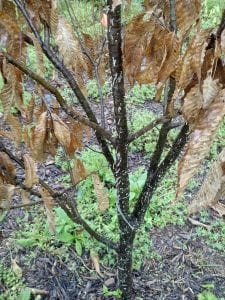
Ambrosia beetle frass strands emerging from a hybrid chestnut at the Rome River EcoCenter.
Chestnut enthusiasts,
Ambrosia beetles may soon appear in our chestnut orchards. These beetles normally start wood boring activity as soon as we get three 70oF days in a row in the early spring (usually early March in Georgia). Boring activity lasts until the trees fully leaf out in mid-April. The beetles spread a fungus into the tree, which then spreads throughout the tree eventually killing it. Activity can be noted by small (+/- 1 mm diameter) circular holes in the bark. Holes may weep sap or may have “toothpicks” of sawdust/insect feces sticking out of the holes. Trees in the stem diameter range of about ½ inch to 4 inches are generally susceptible to attack. Generally attacks occur at about head height down to the base of the tree, although sometimes they get higher in the tree.
A preventative that we use in our backcross orchards is a bark spray using the active ingredient bifenthrin (e.g., Bifen IT). The application rate we use is 0.7 oz of a product containing 8% of the active ingredient per gallon of water. We are also using a bark penetrant called Pentra Bark mixed into the sprayer for greater residual activity. We encourage you to take similar steps to protect your trees if they are in the susceptible size range. We usually try to spray trees once every two weeks from late February until bud break. Now is the time to begin preparing to combat these pests.
If you do get beetles in your trees, continue to spray all trees, but wait about 30 days, then cut the infested trees to the base (these are the trees that generally fail to leaf out). Remove the trees from the site and burn them or chip them well to compost them. Normally, healthy chestnut trees will re-sprout from the base and can grow to heights up to 5 – 10 feet by year’s end.
We have rescued heavily infested orchards using a combination of the above two approaches, so it is possible to win this battle. Once trees have gotten large enough, they do not typically experience further attacks.
If you have any questions, or notice Ambrosia beetles in your trees, please let us know at gro.fcat@retpahCAG.

